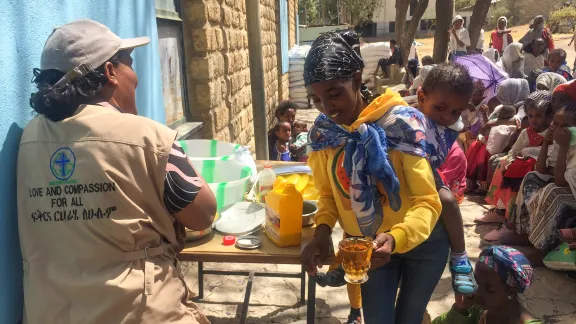
Ethiopian Evangelical Church Mekane Yesus (EECMY) and its diaconal agency, the Development and Social Services Commission (DASSC), works with LWF World Service to provide food distribution and cooking demonstrations to pregnant and lactating displaced women in Mesobo IDP camp. Photo: EECMY/G. Tesfay
LWF joins ecumenical and interfaith partners in calling for stronger local leadership in crisis response
(LWI) - The Lutheran World Federation (LWF) joined an ecumenical and interfaith group of international faith-based organizations on 14 June in calling for stronger, more meaningful partnerships with the United Nations and other secular agencies that respond to humanitarian crises.
The webinar, organized by the LWF in partnership with the Catholic Agency for Overseas Development (CAFOD), Islamic Relief Worldwide (IRW), Christian Aid, ACT Alliance and Tearfund, focused particularly on ways of promoting local faith-based leadership in crisis responses.
In opening remarks, LWF’s Global Humanitarian Coordinator Allan Calma spoke about progress made since the 2016 World Humanitarian Summit in Istanbul, which generated new partnerships and pledges for more joined-up action to bring aid to the world’s most vulnerable people and communities. Notably, the so-called ‘Grand Bargain’, signed by some of the largest donors and humanitarian organizations, committed to improving the effectiveness of their crisis response by working more closely with local and national aid and development agencies.
Need for consistent approach to localization
Welcoming the launch of a new report on localization by the global Catholic confederation, Caritas Internationalis, Calma said the LWF was also exploring ways of strengthening cooperation between its World Service department and member churches in countries across the globe. He pointed to the recent publication of a Guidance Note on joint engagement between World Service country programs and member churches as an important step in that direction.
But despite the momentum produced in the wake of responses to the COVID-19 pandemic, Calma said “there is still no consistent or transformative approach either to localization in general, or to the engagement of national and local faith-based actors in particular.” He pointed out that “a certain level of distrust or discomfort amongst secular humanitarian agencies or donors” persists when dealing with faith-based organizations, despite their “positive contributions and real added value in community-based responses” to crisis situations.
Faith and Partnerships Advisor for Islamic Relief Worldwide, Atallah FitzGibbon, highlighted what has been called the “cycle of alienation” and the complex range of concerns of secular agencies in dealing with faith-based organizations. These include fears about proselytization, impartiality, gender bias, and lack of formal accountability mechanisms, he said.
Added value of faith-based organizations
He noted that humanitarian professionals often use a “jargon-heavy vocabulary” that is incomprehensible to grass-roots religious communities and he called for “spaces of dialogue and learning for us all to speak the same professional language.” FitzGibbon gave examples, such as Kashmir, Kenya and South Sudan where “reciprocal and mutually empowered partnerships” with local faith-based groups can be “transformative.”
Speaking from a U.N. perspective, Marina Skuric Prodanovic, chief of the system-wide approaches and practices section of the Office for the Coordination of Humanitarian Affairs (OCHA) highlighted the added value that local faith-based organizations offer. She noted that they are “deeply embedded” within communities, bringing a “diversity of voices” and “staying for the long haul,” unlike international agencies which arrive in a country during an emergency and leave again once the critical phase is over.
Furthermore, she said, faith leaders understand the nexus between conflict and development, while their influence and advocacy networks “often transcend what we can do.” She said it is important to build trust, to “see ourselves as complementary,” while also urging faith-based groups to ensure that aid is distributed on a need-based approach, rather than favoring one religious community over another.
Mutuality, not instrumentality
Stella Ogunlade, chief of partnerships and coordination for the U.N. Refugee Agency (UNHCR) reaffirmed the need to strengthen the capacity of local non-governmental organizations and to work towards more mutual partnerships: “it is not just about us training them, but also them training us,” she emphasized. It is important to make their contribution visible to donors and to the media, she added, and to support their participation at leadership and decision-making levels.
Step up dialogue [...] on how to work better together to ensure the best results for the communities we serve.
Participants also heard about best practices from two local Caritas agencies in Southern Africa and in Nigeria, where faith leaders worked together to secure funding for their COVID-19 prevention and support programs. Panelists agreed on the need to channel more direct and multi-year funding and capacity building to national and local faith actors and to ensure that partnerships are always based on “mutuality, not instrumentality.” Calma concluded: “It is important to be aware of our conscious and unconscious biases” and to step up “in-depth dialogue and discussion on how to work better together to ensure the best results for the communities we serve.”
LWF/P. Hitchen


